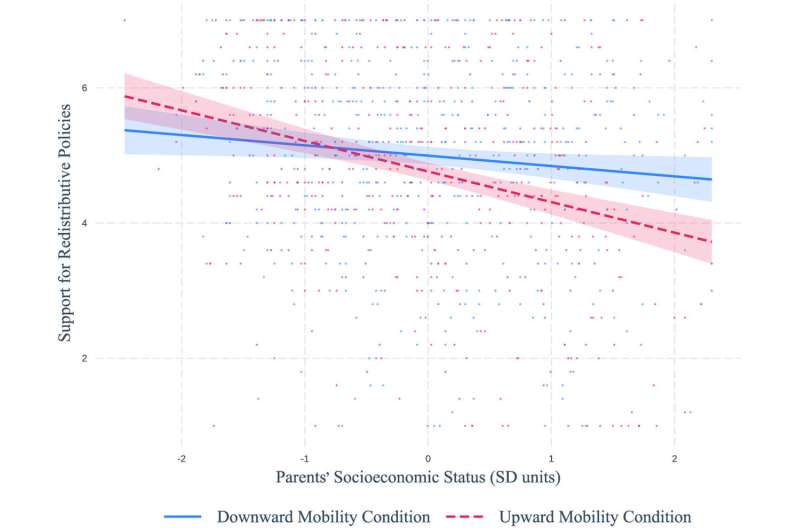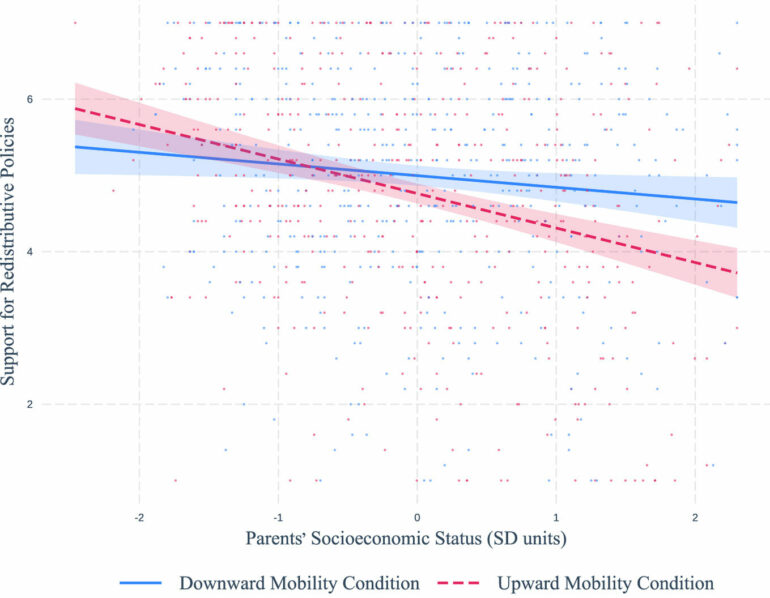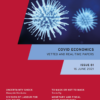Opportunity hoarding has gained attention over the last several years, particularly after the 2019 Varsity Blues Scandal in which wealthy, well-known parents used their money, status and privilege to illegally get their children into university.
This example highlights the extreme of opportunity hoarding, but a recent Northwestern University study suggests that these kinds of behaviors allow high-SES (socioeconomic status) parents to accumulate advantages, often at the expense of low-SES families. One major belief contributing to this is the idea of “the American dream.”
The study focuses on how parents—given the central role they have in shaping a child’s access to resources and their broader development—have significant opportunities to use their privilege to influence opportunities and hoard resources. It also examined how the belief that one can “pull themselves up by their bootstraps” influences whether they deem hoarding resources an acceptable behavior or not.
“Whether this involves affluent parents bribing a university official to get their child into college or using their connections to secure a prestigious internship, people recognize the ways in which opportunity hoarding exacerbates inequality and undermines our country’s ability to live up to its ideals,” said David Silverman, doctoral candidate and Presidential Fellow in Northwestern’s department of psychology.
“Our studies add to these conversations by showing one of the key factors that motivates people to engage in opportunity hoarding. This is essential to not only making us aware of when opportunity hoarding might be most likely to happen, but also finding ways to prevent it from occurring in the first place.”
The research team was led by Silverman with senior co-author, Mesmin Destin, professor in the School of Education & Social Policy (SESP), department of psychology and faculty director of student access and enrichment at Northwestern. Other authors include Ariel Kalil, the Daniel Levin Professor at the Harris School of Public Policy at the University of Chicago.
The study, “Economic mobility and parents’ opportunity hoarding,” was published Sept. 3 in the Proceedings of the National Academy of Sciences.
Opportunity hoarding can manifest itself in a myriad of ways across socio-economic systems, said Silverman.
“We focus on two of the most common and impactful manifestations of opportunity hoarding—parents opposing redistributive policies that would primarily benefit lower socioeconomic status families, for example, allocating more tax dollars to schools in lower-income areas, and engaging in specific behaviors that unfairly advantage their own children, such as allowing their child to misrepresent their identities on a college application.”
Method
The researchers conducted two studies which examined how American parents’ beliefs about the economy affect their support of policies that would give their children an advantage, even when that advantage came at a cost to children from underrepresented communities.
In their first study, the researchers asked more than 1,500 American parents about the extent to which they believed that the American dream of socioeconomic mobility was possible. The parents were a mix of high-, low- and middle-SES parents—with an annual household income of $190,000 or more being considered high SES.
The second study helped solidify these findings through manipulating parents’ mobility beliefs. They recruited more than 1,000 parents and showed them one of two short videos about the state of the U.S. economy based on data from the U.S. Census Bureau.
Half of the parents were randomly selected to watch a video highlighting the millions of Americans who are expected to climb the economic ladder—upward mobility. The other half of the parents watched an almost identical video that instead highlighted the millions of Americans who are expected to lose their positions on the economic ladder—downward mobility.

Effect of the upward mobility condition on parents’ support for redistributive policies by socioeconomic status. Findings indicate that the upward mobility condition decreased high-SES parents’ support for redistributive policy relative to the downward mobility condition. © Proceedings of the National Academy of Sciences (2024). DOI: 10.1073/pnas.2407230121
Results
The results showed that believing in “the American dream,” the idea that anyone in America can climb the socioeconomic ladder, increases the chance that privileged parents would engage in opportunity hoarding.
“Although the video describing the prevalence of downward mobility presented a bleaker picture of the state of the economy, it was actually the more optimistic video focused on upward mobility that led affluent parents to engage in opportunity hoarding,” Silverman said.
“We suggest that this is because other people having the opportunity to climb the economic ladder represents a unique threat to affluent families and their chances of maintaining their privileged positions in society.”
Both high- and low-SES parents who have not been inundated with the idea of the American dream believe resource hoarding is wrong. High-SES parents who do think socioeconomic mobility could occur were 17% more likely to view resource hoarding as acceptable behavior. Interestingly, low-SES parents who were similarly optimistic were not as accepting about hoarding resources.
“Gaining insights into parents’ behavior—and the beliefs that shape how they invest in their children—is essential if we want to better understand the sources that drive inequality of opportunity for children in today’s society,” Kalil said.
What’s next
Researchers are hoping these results will help policymakers better understand the factors that contribute to rising economic inequalities. Silverman is also looking to expand on the examples of opportunity hoarding.
“Although we focused on more overtly unjust behaviors to provide strong initial evidence for opportunity hoarding, this can also manifest in more socially acceptable behaviors that reinforce existing inequalities, like affluent parents hiring an SAT tutor when similar resources are not readily available to children from lower-SES families,” he said. “Examining these behaviors will help us understand the boundary conditions and consequences for our current findings.
“Our next steps will be to examine how we can ‘shut off’ the threat that socioeconomic mobility might pose to a high-SES parent so that they can engage in more productive behaviors that facilitate people’s equitable access to quality educations and economic opportunity.”
More information:
David M. Silverman et al, Economic mobility and parents’ opportunity hoarding, Proceedings of the National Academy of Sciences (2024). DOI: 10.1073/pnas.2407230121
Provided by
Northwestern University
Citation:
Privileged parents who believe in economic upward mobility are more likely to hoard resources: Study (2024, September 4)



